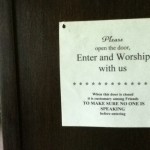Marshall Massey sent me (Peter) this email last December, in response to my post on Reading the Bible Again For the First Time: Taking the Bible Seriously But Not Literally, by Marcus J. Borg, but I had just switched to a new email address so I didn’t find it until this week when I went back to sift through all the spam at my old account looking for something else. Hoping that late is better than never, I’m going to take him up on his offer to let me to post his comment here. Though it’s in response to an old post, much of what he says is also relevant to the current thread on theological diversity and corporate worship.
Borg, as you quote him, states that “The conflict is between … a ‘literal-factual’ way of reading the Bible and a ‘historical-metaphorical’ way of reading it.” While this is literally true, I think it is a shallow and misleading way of looking at what’s actually going on. The two sides are not simply quarreling about how to read the Bible; they are quarreling over the much bigger and much broader issue of what is right and what is wrong, and below that, the much deeper issue of how we are to know the difference. The right wing gives its loyalty to one Power, that teaches it what is right and what is wrong in a way that emphasizes moral strictures and tribal values; the left wing gives its loyalty to a rather different Power, that teaches it right and wrong in a way that emphasizes broad tolerance and personal liberty. Each side labels its own chosen Power, God; each looks on the other’s as false. Thus it is not a conflict merely between two ways of reading the Bible, but a conflict between two great Powers, each of which controls human perception in different ways.
I would remind you, and others who might read this, that in this conflict, Friends have historically taken the side of the Lamb. That means that, no matter which set of teachings they happen to be personally drawn to – the one Power’s or the other’s – they are committed to the methods of the Lamb: meekness, gentleness, a readiness to listen, and a strict limiting of what they say to the things that are purely true and loving. This commitment makes it possible for Friends who are drawn to either side, whether it is to the one Power’s side or to the other’s, to rise above the conflict that Borg describes, to exist in harmony and love together, and to hear each other’s measure of truth. And this is oh-so-important –
I quite agree with Bill Samuel when he says there is a lack of a clear spiritual center in liberal Quaker communities. You may be experiencing sitting in an ocean of light – in fact, I’m sure you do, since otherwise you’d never have brought the matter up – but if you ask around, I think you’ll find, as I myself found, when I asked, and as Michael Sheeran found and recorded in his book Beyond Majority Rule, that a great many of the members and attenders at liberal meetings do not experience that ocean, and are actually present for other reasons. In the absence of that clear spiritual center, much of what draws liberal Friends to one another is their shared affection for the Power that we identify with cultural “liberalism”.
I would add that I personally see a similar lack of a clear spiritual center in evangelical Quaker communities. I don’t believe that the religious fervor these communities visibly possess, and their shared ideas about what it is they are fervent about, are the same thing as a spiritual center; they are an emotional and ideological center, to be sure, but to have a clear spiritual center, one must lay down one’s self-hypnotizing emotions and beliefs, and come to the great and awesome Reality that stands beyond and above such things. The growing division between evangelicals who continue to support the political right and those who now question where the political right is going, is, in my estimation, evidence of a lack of spiritual centeredness that has long been obscured by passion and conviction, but that cannot be so obscured forever. And I think that in the absence of a clear spiritual center, evangelical Friends are showing themselves very capable of being misled by shared affection for the Power we identify with religious and cultural conservatism in this country.
If Friend McCandless used the word “unity” as you represent (you report that he “said something along the lines of ‘Unity does not mean we are in agreement; unity means we are girded about by the bonds of love as we labor together’), then I believe he abuses the historical Quaker sense of what “unity” means. Historically, Friends have been interested in discerning the will of God, which is a will towards that which is simultaneously totally upright (the underlying emphasis of the Right) and totally kind (the underlying emphasis of the Left), and then uniting themselves with that will, an act which requires the complete surrender of one’s own beliefs, desires and plans. That is something qualitatively different from, and much tougher than, just “laboring together in the bonds of love”. One can “labor together in the bonds of love” while still giving one’s loyalty to this Power or that one. To truly come to unity requires leaving all that lesser loyalty behind.
As I write these words, I am listening to Ralph Vaughan Williams’s lovely Fantasia on Christmas carols (performed by John Rutter and the Cambridge Singers), a composition that embodies an awful lot of the actual agenda of Christianity as expressed by its first apostles. Listen intently as I can, I cannot hear any support in it for the mutually-exclusive elements of the agendas of Left and Right. Have we ceased being children enough to understand the significance of this?
Your blog offers no way for me to post this comment directly, since I decline to open an account with either Google or Blogger. So I am taking the liberty of sending you this by e-mail. If you want to post it to your blog yourself, please feel free.
All the joys of the season to you and Cat,
Marshall Massey















